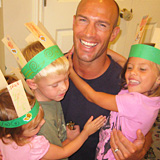Building and Maintaining a Positive Relationship with Your Child's Provider
Your work isn't over just because you've found the appropriate childcare setting for your child. Once you have enrolled your child in a child care program, you will want to make sure that it will be a positive and rewarding experience for everyone involved. An effective child care partnership benefits the parent, the childcare provider, and the child. Your child's providers are counting on you to keep up your end of the bargain; they keep your child smiling, safe, healthy, and happy while you're at work, and you agree not to take advantage of them. Through good communication and by working together, you and your child's provider can help to ensure that your child receives the best start to his or her life. There are several steps you can take, as a parent, to build a successful partnership with your child's provider. You can show appreciation for your childcare provider, their home, and their business by being thoughtful and considerate in the following ways.
Be sure you read and understand the childcare programs policies/procedures and requirements before you enroll your child. These rules are put in place to help all involved succeed. Do your best to abide by the policies and procedures to which you have agreed.
Turn in all necessary paperwork. Even before your child attends his first day of child care you'll need to submit a number of documents, such as immunization records and medical health release forms. State law mandates that all child care programs comply with this law, so help your childcare provider out, and hand in forms on time. During the duration of the program, you'll need to sign permission slips authorizing providers to give your child medications, such as antibiotics for an ear infection, etc. Sign these right away, and turn them in.
Let your provider know as much as possible about your child. They need to know what words your child uses to ask for things, their nap, eating, and toilet habits, their likes and dislikes, and any information about their general development. A quality provider will take your child's unique characteristics into consideration as they care for him or her.
Develop a rapport. This starts with a very simple but genuine, "Good morning. How was your weekend? Your new haircut is adorable." Yes, technically you're a client paying for a service, but childcare is much more than a business relationship. You want all the pleasantries that should come along with someone watching your child; the stuff money can't buy. Frequent, informal communication between you and your child's provider are an important part of building a good relationship. Taking a few moments to talk briefly with your child's provider when you drop-off and pick-up your child, can keep the lines of communication open and can make sharing information about your child a matter of routine. Should concerns arise, a good relationship can make it easier to arrive at a solution.
Bring up any problems or concerns immediately with the childcare provider. Handling problems with a childcare provider; whether in daycare, your home or elsewhere, requires diplomacy, maturity, and directness. After all, this person is watching your child, so you want your relationship to be the best it can be. Talk to your child's provider. Take a non confrontational approach, looking to come up with a solution to a problem together. Your relationship with your childcare provider is important, so communicate clearly from the start. Discuss everything that comes to mind. You won't want to deal with any misunderstandings later.
Let your childcare provider know you appreciate his or her efforts. Just as you'd tell an employee what a good job he or she did on a project, you should also compliment your childcare provider. Positive reinforcement will lend itself to a better parent-provider relationship, and will make the provider more receptive, if you ever have any problems or concerns.
Make sure your child has all the supplies he or she needs at daycare. Keep extra clothes in your child's cubby in case of spills or bathroom accidents. If your child comes home wearing spare clothing, make sure you bring a fresh set the next day. Periodically check your child's cubby to make sure they still have all of their necessary items needed at daycare. As the weather changes throughout the year, so do your child's items needed at daycare. By ensuring all of your child's necessary belongings remain with him or her at daycare, you are doing your part to help your child's provider and your child's day run more smoothly. This way, your child can be cared for in the best possible way.
Pick up your child on time. Emergencies do happen, so have a backup plan with someone who can pick up your child if you are unavoidably delayed. Also, call your childcare provider to keep them well informed of any time constraints that you may have. Childcare providers have lives too, and when you're late, you make them late for their own appointments. Your child's provider may have children of their own that they must pick up on time.
For the health and safety of your child and all of the children in the provider's care, do not bring your child to daycare sick. Childcare providers must maintain the best interests and well being of all the children in their care. That goal is compromised if a child is brought to daycare sick. If your child becomes sick while at daycare, be sure to pick him or her up promptly. It is a good idea to have some form of back up care in the event that your child becomes ill.
Report any illnesses to your childcare program. Germs travel fast among children. Your childcare provider needs to know if your child has been exposed to any highly contagious disease such as pinkeye or chicken pox, or a more common ailment such as a cold or flu. State law requires that all childcare programs notify parents of children who have been exposed to certain contagious diseases.
Read all notices and mail you get from the childcare program. When you see a sheet of paper in your child's cubby, don't just toss it in the trash. You may need to keep it for future reference. You might also miss out on valuable information about provider holidays, vacations, future activities, and information concerning your child and his or her day at daycare. We at Building Blocks Home Daycare do our best to keep parents well informed of any and all pertinent information concerning you and your child.
Let providers know if your child needs extra care on a particular day. If your child didn't sleep well the night before, or your husband or wife is away on a business trip and your child is missing him or her, let the provider know. That way, they will be able to give your child the extra TLC that he or she may need.
Let your childcare provider know if your child's routine will change on a given day. If grandma is in town and wants to pick up your child in the afternoon, tell the provider. Childcare programs should not release your child to anyone but you, unless you give permission to do so. If you'll be picking up your child early for a doctor's appointment, let them know that, too. Call if your child will be absent. The provider's entire day is structured around caring for yours and others children (i.e. preparing meals, outings and activities, the need for a substitute or not). If your child or other children are going to be absent for a particular day, it can change many factors directly affecting your provider's daily schedule. Therefore, advance knowledge of these changes can be very helpful for your child's provider.
And of course, pay your childcare fees on time. Be responsible and prompt with payment. Life can be hectic at times, and it can sometimes be easy to forget to pay your child's provider on time. However, keep in mind your childcare provider is counting on those funds to pay their mortgage, power, and water bills to ensure that they have a warm, well lit, and well supplied environment to care for children and do their job in the best possible way.



